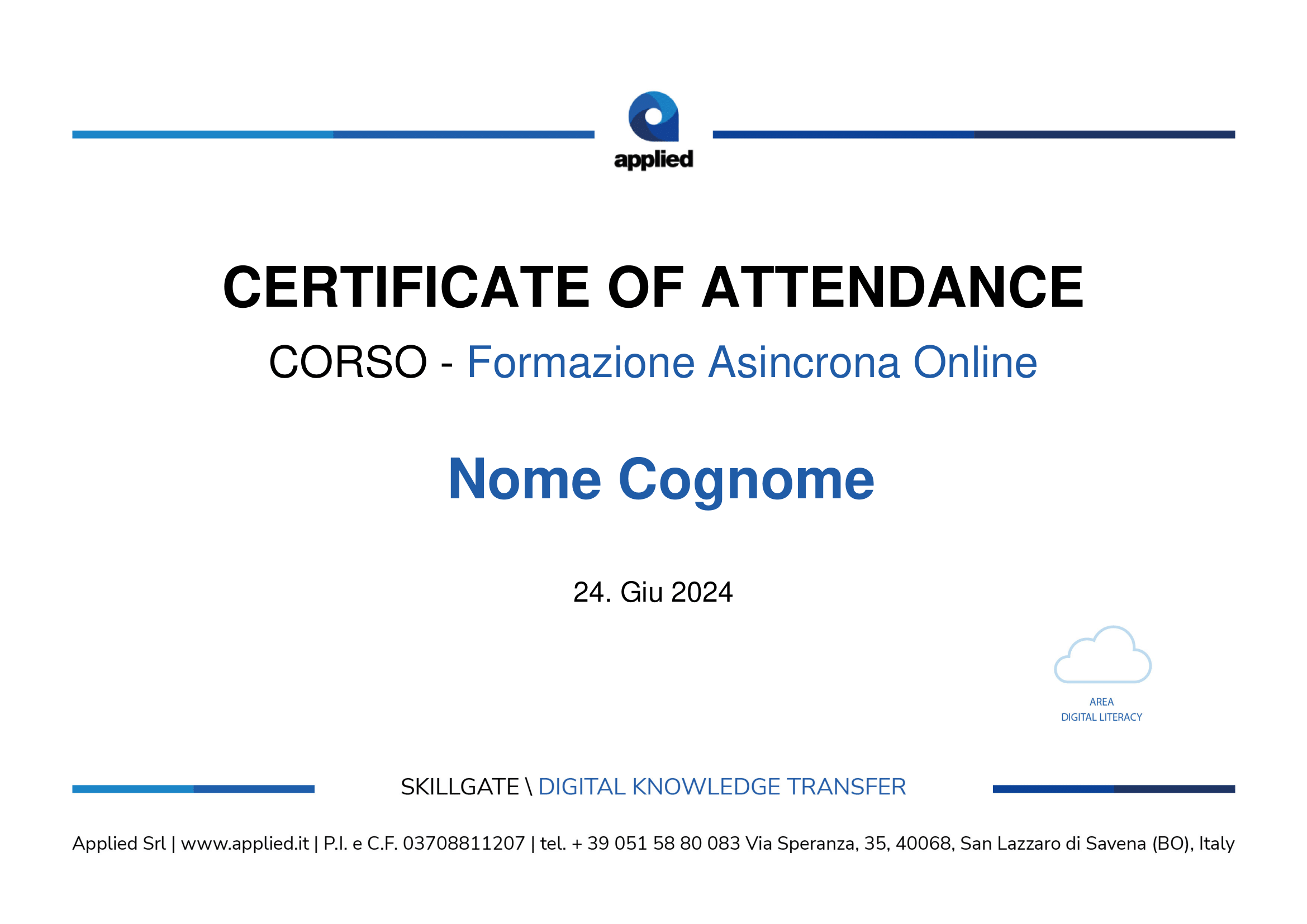Cloud Computing
Cloud Computing course: on-demand IT services, Pay per Use, IT resource management without hardware, ROI and IaaS/PaaS/SaaS models.

Course description
Cloud computing refers to the deployment of computing services, such as servers, storage resources, databases, networking, software, analytics, and more, via the Internet ("the cloud"), and the companies that offer these computing services are called cloud service providers: hence the transformation of IT services from on-premise to on-demand. The easiest benefit to perceive certainly is the ability to rapidly leverage IT resources at very little cost.
Specifically, with Cloud Computing there is no need to make large investments in purchasing and managing hardware.
On the contrary, it is possible to provision ("harvest") computing resources according to particular needs also because payment is linked to actual use: in fact, the cloud computing service is based on the Pay per Use model, eliminating expenses regarding hw and sw purchase, local data center configuration and management, IT experts.
Main topics:
- Cloud computing introduction and history
- What is Cloud Computing, advantages, focus points and costs
- Business models and evaluation of ROI
- Service models: differences between IaaS, PaaS and SaaS
- Deployment models: public cloud, private cloud, hybrid
Who is the course for?
Job opportunities and roles that benefit from this course
After-sales
- After sales inspector
Design
- Electrical sw designer
- Electrical hm designer
- Mechanical designer
Sales
- Area manager
Staff
- Management personnel responsible
Course goals
Cloud technologies Basic Concepts
Definining the concept of IT Security, understanding the difference between data and information and defining its central aspects
Platform and Providers
Knowing the types of existing platform/providers, the main standards used, and the types of services enabled by these solutions
Working with Cloud Technologies
Learning how to manage the application of cloud technologies in the enterprise and govern their limitations and attention points
Benefits of Cloud computing
Discover the benefits of migrating to cloud technologies for today's markets
This course includes
-
Examples of real business cases
-
Course completion certificate
-
Help desk support
-
Access from mobile and tablet
-
Comprehensive monitoring of educational progress
-
Skills assessment test (mandatory)
-
Intermediate assessment tests (optional)
Course completion certificate
After completing the course it is possible to obtain a downloadable certificate to display as evidence of the skills achieved. The certification can be combined according to company needs.


Course's lecturer
Andrea Galli
- Solution Architect
- Senior IT Consultant
- Years of consolidated experience in ICT Projects
Course's contents
- Introduction and key concepts
- Focus on the service
- Scalability and flexibility
- Availability and reliability
- Easy management and Interoperability
- Performance and optimization
- Accessibility and portability
- Datacenter
- Global network
- Areas and Regions Interconnection Security, Trust & Compliant
- Introduction to service models
- IaaS, PaaS, SaaS and new models
- Distribution models
- Public, Private, Hybrid e Multi-Cloud
- Applied Orchestration & Edge solutions
- Current situation
- Cloud transformation journeys
- Application migration
- International market
- Italian market
- Forecast
- For the market and businesses
- Reducing the initial investment
- Focus on business
- Better utilisation of resources
- Cloud as an enabling technology
- Mainframe
- Structure
- Client-server
- Grid Computing
- Cloud Computing
- Definition
- Energy saving
- Remote working
- Paperless
Entry requirements
Access to any browser
PC / Tablet / Smartphone device
Internet connection
Connected Machine Area
Discover the training courses designed specifically for the roles involved in the management of projects based on Connected Machines for the improvement of production plants and processes.
| After-sales | AI & Machine Learning | Cloud Computing | Business intelligence & OEE | Big Data & Data Governance | Information Security | Internet of Things (IoT) | Service Management |
| After sales inspector |  |
 |
 |
 |
 |
 |
 |
| Design | AI & Machine Learning | Cloud Computing | Business intelligence & OEE | Big Data & Data Governance | Information Security | Internet of Things (IoT) | Service Management |
| Electrical sw designer |  |
 |
 |
 |
 |
 |
|
| Electrical hm designer |  |
 |
 |
 |
 |
 |
|
| Mechanical designer |  |
 |
 |
 |
|||
| Sales | AI & Machine Learning | Cloud Computing | Business intelligence & OEE | Big Data & Data Governance | Information Security | Internet of Things (IoT) | Service Management |
| Project manager |  |
 |
 |
||||
| Area manager |  |
||||||
| Marketing officer |  |
||||||
| After sales assistant |  |
 |
 |
||||
| Staff | AI & Machine Learning | Cloud Computing | Business intelligence & OEE | Big Data & Data Governance | Information Security | Internet of Things (IoT) | Service Management |
| Technical assistant |  |
 |
|||||
| Management personnel responsible |  |
 |
 |
 |
 |
 |
 |
